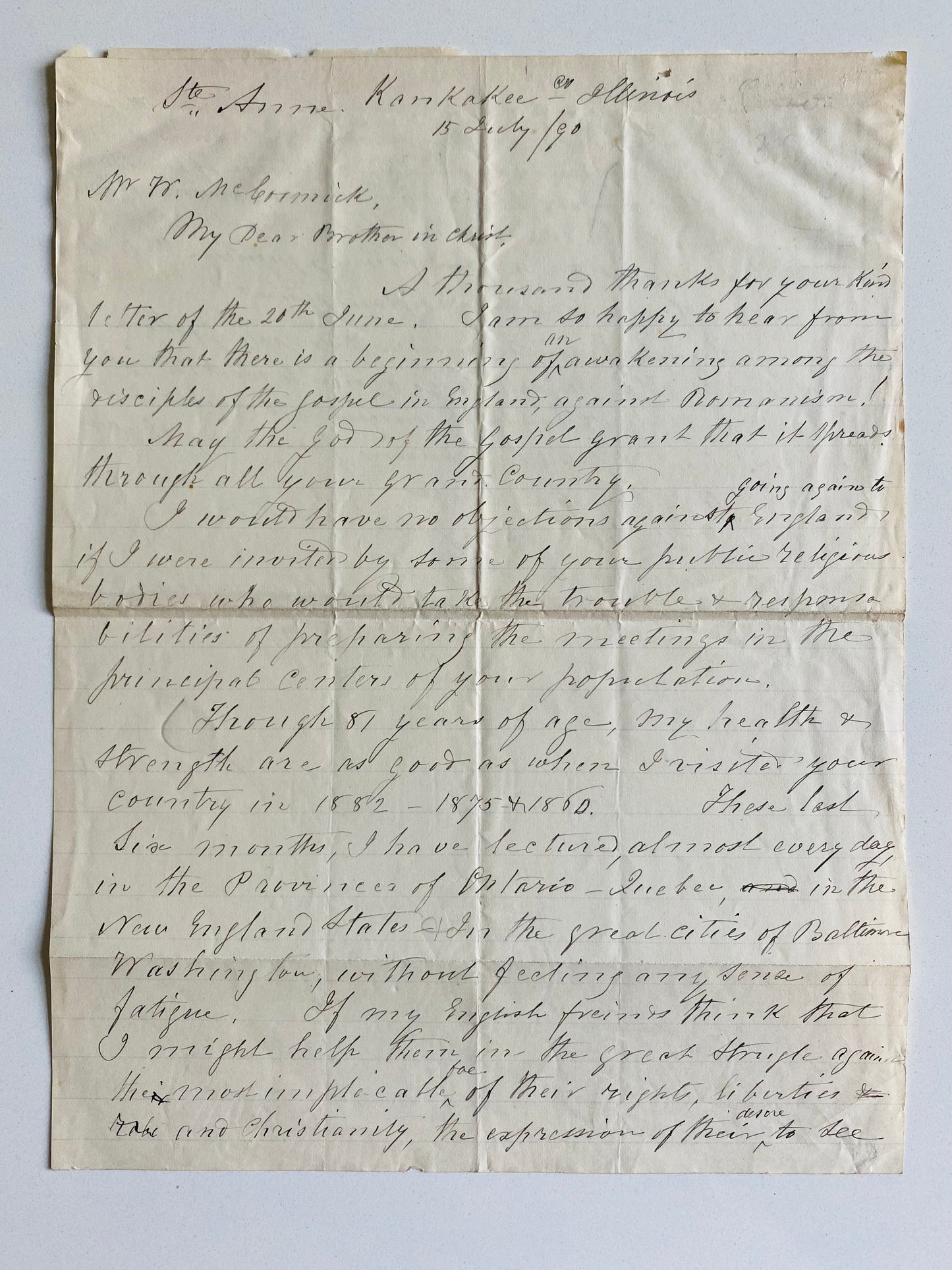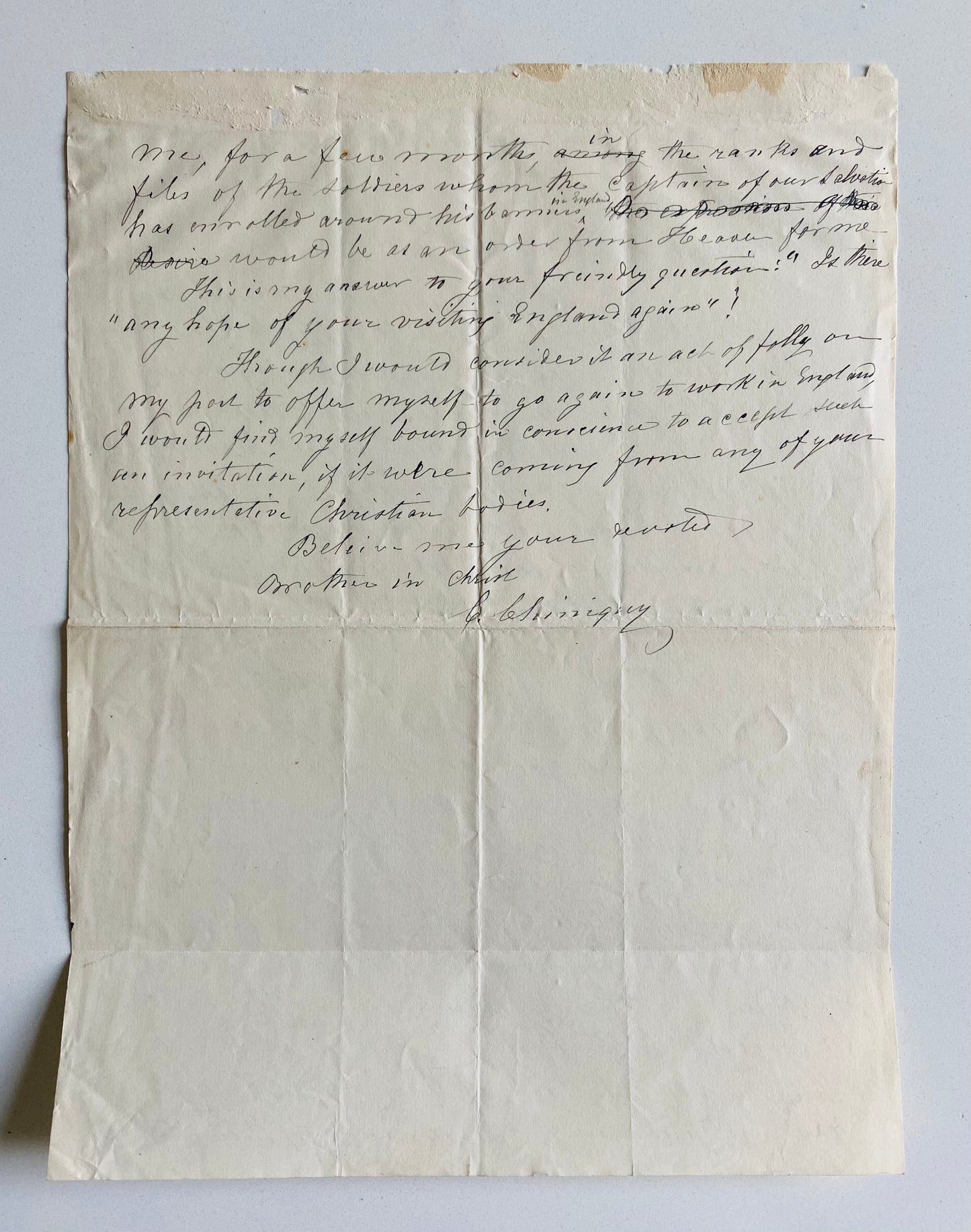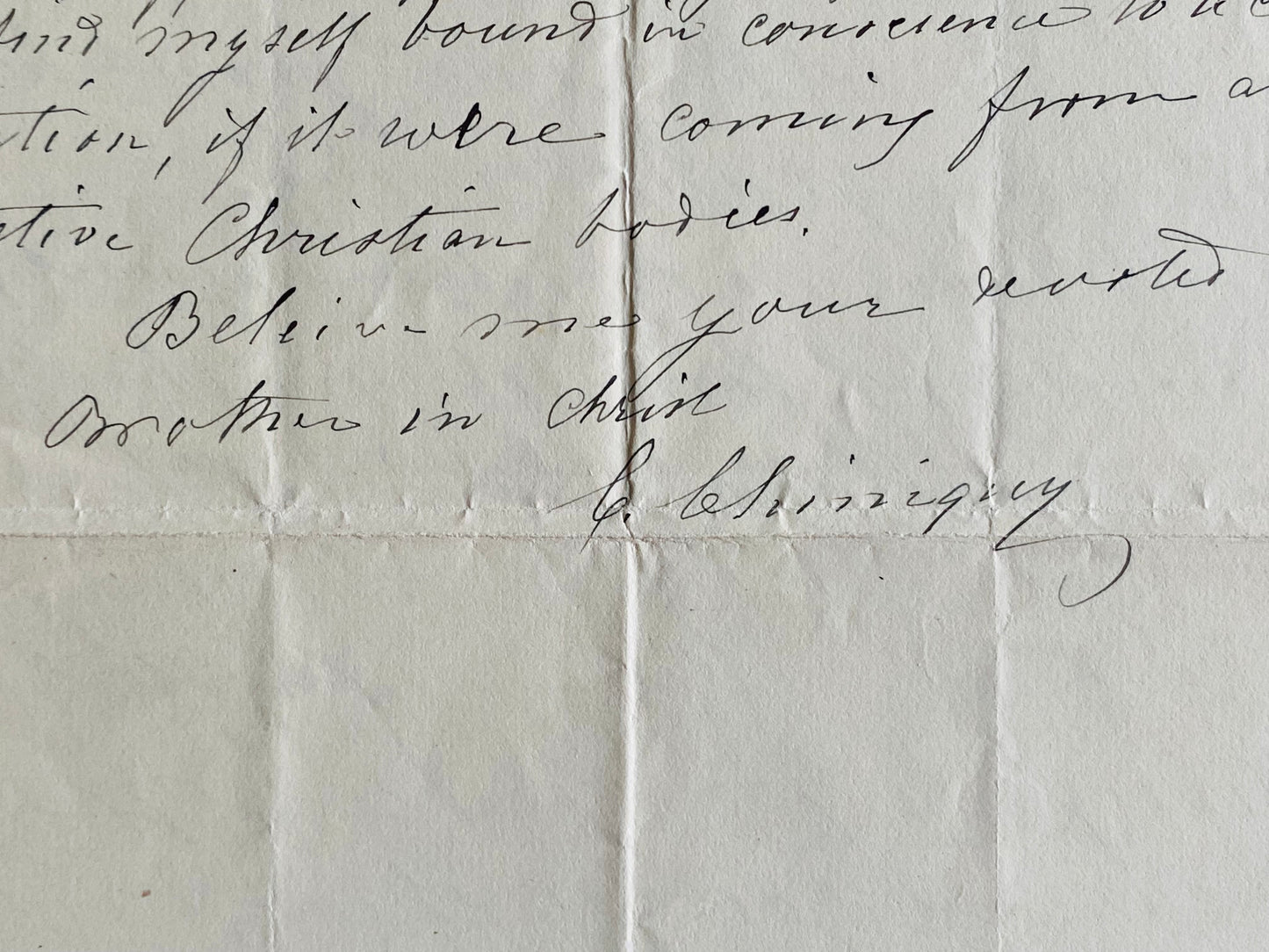Specs Fine Books
1894 CHARLES CHINIQUY. Rare Anti-Catholic Evangelist Letter Re: Popery in England &c.
1894 CHARLES CHINIQUY. Rare Anti-Catholic Evangelist Letter Re: Popery in England &c.
Couldn't load pickup availability
SCARCE AND SUBSTANTIVE LETTER BY CHARLES CHINIQUY, INFLUENTIAL ANTI-CATHOLIC, PROTESTANT PREACHER REGARDING A POTENTIAL PREACHING TRIP TO ENGLAND.
St Anne, Kankakee, Illinois.
15 July, 1890
Mr. W. McCormick,
My Dear Brother in Christ,
A thousand thanks for your kind letter of the 20th of June. I am so happy to hear from you that there is a beginning of an awakening among the disciples of the Gospel in England against Romanism!
May the God of the Gospel grant that it spreads through all your grand Country.
I would have no objections against going again to England if I were invited by some of your public religious bodies who would take the trouble & responsibilities of preparing the meetings in the principal centers of your population.
Though 81 years of age, my health & strength are as good as when I visited your country in 1882, 1875, & 1860. These last six months, I have lectured almost every day in the Provinces of Ontario, Quebec, and in the New England States & in the great cities of Baltimore, Washington, without feeling any sense of fatigue. If my English friends think that I might help them in the great struggle against the most implacable foe of their rights, liberties, and Christianity, the expression of their desire to see me, for a few months, in the ranks and files of the soldiers whom the Captain of our Salvation has enrolled around his armies in England would be as an order from Heaven for me.
This is my answer to your friendly question, "Is there any hope of your visiting England again?"
Though I would consider an act of folly on my part to offer myself to go again to work in England, I would find myself bound in conscience to accept such an invitation if it were coming from any of your representative Christian bodies.
Believe me your devoted,
Brother in Christ,
C. Chiniquy."
BIOGRAPHY.
Charles Paschal Telesphore Chiniquy (30 July 1809 – 16 January 1899) was a Canadian socio-political activist and former Roman Catholic priest who left the Roman Catholic Church and converted to Protestant Christianity, becoming a Presbyterian Evangelical minister. He rode the lecture circuit in the United States denouncing the Roman Catholic Church. His themes were that Roman Catholicism was Pagan, that Roman Catholics worshipped the Virgin Mary, and that its theology was anti-Christian.
Chiniquy founded the St. Anne Colony, a village located in Kankakee County, Illinois in 1851. Fifty Years in the Church of Rome, an extensive autobiographical account of his life and thoughts as a priest in the Roman Catholic Church, was written by Chiniquy and published in 1886. He warned of plots by the Vatican to take control of the United States by importing Roman Catholic immigrants from Ireland, Germany, and France, and suggested that the Vatican was behind the assassination of U.S. President Abraham Lincoln.
Chiniquy was born in 1809 to a French-Canadian family in the village of Kamouraska, Quebec. He lost his father at an early age and was adopted by his uncle. As a young man, Chiniquy studied to become a Roman Catholic priest at the Petit Seminaire (Little Seminary) in Nicolet, Quebec. He was ordained in 1833; after his ordination, he served his church in Quebec. During the 1840s, he led a campaign throughout Quebec against the consumption of alcohol and drunkenness.
Later he immigrated to Illinois in the United States. In 1855, Chiniquy was sued by a prominent Catholic layman named Peter Spink in Kankakee, Illinois. After the fall court term, Spink applied for a change of venue to the court in Urbana, Illinois. Chiniquy hired the then-lawyer Abraham Lincoln, the future 16th President of the United States, to defend him. The spring court action in Urbana was the highest profile libel suit in Lincoln's career. The case was ended in the fall court session by agreement.
Chiniquy clashed with the Bishop of Chicago, Anthony O'Regan, over the bishop's treatment of Roman Catholics in the city, particularly French Canadians. He declared that O'Regan was secretly backing Spink's suit against him. Chiniquy said that in 1856, O'Regan had threatened him with excommunication if he did not go to a new location where the bishop wanted to assign him. Several months later, The New York Times published a pastoral letter from O'Regan in which he stated that he had suspended Chiniquy. Since Chiniquy had continued his normal duties as a priest, the bishop excommunicated him by his letter; he vigorously disputed that he had been excommunicated, saying publicly that the bishop was mistaken. Chiniquy left the Roman Catholic Church in 1858, and subsequently converted to Protestant Christianity, becoming a Presbyterian Evangelical minister in 1860.
He asserted that Roman Catholicism was Pagan, that Roman Catholics worshipped the Virgin Mary, and that its theology was anti-Christian. He warned of plots by the Vatican to take control of the United States by importing Roman Catholic immigrants from Ireland, Germany, and France. This was at a time of high immigration rates from those countries, in response to social and political upheaval (the Great Famine in Ireland and revolutions in Germany and France). Chiniquy claimed that he was falsely accused by his superiors (and that Abraham Lincoln had come to his rescue), that the American Civil War was a plot against the United States of America by the Vatican, and that the Vatican was behind the Confederate cause, and the assassination of U.S. President Lincoln, and that Lincoln's assassins were faithful Roman Catholics ultimately serving Pope Pius IX.
After leaving the Roman Catholic Church, Chiniquy dedicated his life to preach and evangelize among his fellow French Canadians, as well as other people in Canada and the United States, in order to convert them from Roman Catholicism to Protestant Christianity. He wrote a number of books and tracts expressing his criticism and views on the alleged errors in the faith and practices of the Roman Catholic Church. His two most influential literary works are the autobiography Fifty Years in The Church of Rome and the polemical treatise The Priest, The Woman, and The Confessional. These books raised concerns in the United States about the influence of the Roman Catholic Church. According to one Canadian biographer, Chiniquy is Canada's best-selling author of all time. He joined the Orange Order and said of it: "I always found them staunch and true. I consider it a great honour to be an Orangeman. Every time I go on my knees I pray that God may bless them and make them as numerous and bright as the stars of the heaven above." He died in Montreal, Quebec, Canada on January 16, 1899.
To this day, some of Chiniquy's works are still promoted among Protestant Christians and Sola scriptura believers. One of his most well-known modern day followers was the American Evangelical cartoonist and comic book writer Jack Chick, notable for being the creator of the "Chick tracts"; he also published a comic-form adaptation of Chiniquy's autobiography Fifty Years in The Church of Rome, titled "The Big Betrayal". Chick strongly relied on Chiniquy's claims and books for writing his own anti-Catholic tracts.
Chiniquy, then a Roman Catholic priest, left Canada in the wake of a series of scandals. He was offered a fresh start by James Oliver Van de Velde, Bishop of Chicago, after Ignace Bourget, Bishop of Montreal, asked him to leave in 1851. Chiniquy founded and settled in St. Anne Colony, a village located in Kankakee County, Illinois in 1851. Chiniquy was suspended on 19 August 1856, for public insubordination by Bishop Anthony O'Regan, Van de Velde's successor in Chicago. Because he continued to celebrate Mass and administer the other sacraments, he was excommunicated on 3 September 1856. About two years later, on 3 August 1858, O'Regan's successor, Bishop James Duggan, formally reconfirmed Chiniquy's excommunication in St. Anne.
Chiniquy had definitively left the Roman Catholic Church in 1858, and subsequently converted to Protestant Christianity in 1860. Along with many followers, he joined the Presbyterian Church in the United States of America (PCUSA). He was admitted as a Presbyterian minister on 1 February 1860. Within two years, Chiniquy, in trouble with the Presbytery of Chicago over his administration of charity funds and a college, according to Elizabeth Ann Kerr McDougall in the Dictionary of Canadian Biography, sought a new connection in order to avoid an expensive presbytery trial. The college is identified in the Seventh Biennial Report of the Superintendent of Public Instruction of the State of Illinois as Saviour's College, founded in 1860; it is listed neither in Universities and Colleges nor Academies and Seminaries of various grades and courses, but in the Theological Seminaries and Church Schools class of institutions. The report states it "is designed to supply the educational wants of the colony brought by Father Chiniquy from Canada to this State, and to prepare men who will be fitted to preach the gospel in the regions whence he came." The report also quotes a description of the school, attributed to correspondence from a Montreal newspaper, unnamed in the report, that people, also unnamed in the report, "examined the day school or college, as the people there delight to call it" and wrote that it had five classes, ranging from students learning the alphabet to students learning the "intricacies of French and English grammar, composition, and the other studies of the school, besides the elements of Algebra, Latin, and Greek."
Alexander F. Kemp was chairman of the Synod of the Canada Presbyterian Church committee that examined Chiniquy's application for admission as a minister. According to Kemp, Chiniquy was involved in both presbytery and civil court proceedings connected with the administration of charitable funds and with what Kemp described as an educational institute. The Presbytery of Chicago charged him with un-ministerial and un-Christian conduct; Chiniquy was expected to answer these charges before the presbytery. At that stage of the proceedings, he and his congregation resolved to separate from the Presbytery of Chicago and the Old School (PCUSA), and to request recognition from the Canada Presbyterian Church. The Presbytery of Chicago charged Chiniquy with misrepresenting that a real college was in operation in St. Anne. After conducting an inquiry, Kemp suggested that Chiniquy and his congregation be admitted into the Canada Presbyterian Church.
In St. Anne, a religious society was incorporated in the state that was named the "Christian Catholic Church at St. Anne". It was classified as a Protestant religious association. Two years later, when it joined the PCUSA in 1860, it took the name of "First Presbyterian Church of St. Anne".
Share






